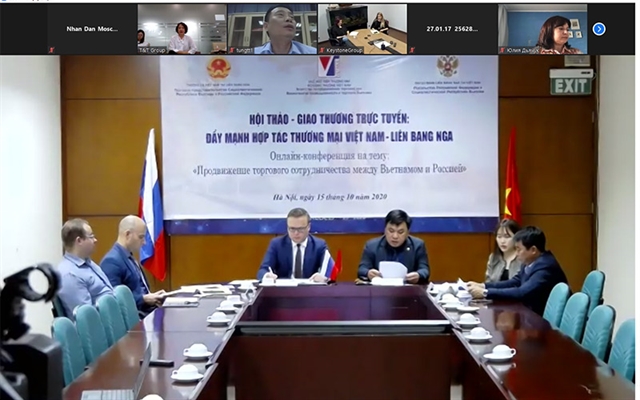Viet Nam should increase its investment in logistics infrastructure to facilitate the flow of goods exported to Russia, according to an expert.

Viet Nam should increase its investment in logistics infrastructure to facilitate the flow of goods exported to Russia, according to an expert.
The statement was made by Shamil Magomedov, Deputy Executive Director Russian Retail Market Experts Association, at a webinar aiming to bolster trade between Viet Nam and Russia held on Thursday in Ha Noi.
The event was jointly organised by the Department of Trade Promotion (Vietrade) at the Ministry of Industry and Trade, the Trade Office at the Embassy of Viet Nam in Russia in collaboration with the Russian Embassy in Viet Nam, the Chambers of Commerce and Industry of Saint-Petersburg and Primorsky Krai.
It drew representatives of more than 30 Vietnamese firms and nearly 80 Russian ones in industrial-agriculture, pharmaceutical industry and cosmetics, exports-imports, transport-logistics, e-commerce and legal consultancy, among others.
Many Vietnamese products have attracted Russian interest but their presence in this market remained insignificant, said Shamil Magomedov.
He said the webinar offered opportunities for businesses of both sides to promote business relations, seek co-operation in trade and better study each other’s market.
Due to the specific geographical distance between the two countries, it takes a long time for Vietnamese sellers to distribute their goods to other states, thus Vietnamese enterprises should promote the export of products with long shelf lives and long-term storage ability, Magomedov said.
Vietnamese firms needed to invest more in logistics infrastructure so that the delivery of goods to Russia is more convenient, fast and cost-effective.
Businesses of both sides should consider establishing a Trade House, a business that specialises in facilitating transactions between a home country and foreign countries, in Russia and Viet Nam to facilitate product distribution, he added.
Currently in Russia there are many Vietnamese restaurants and food chains. Vietnamese businesses can consider linking the sales of their goods into these chains so that Vietnamese products can be further promoted and achieve easier access to Russian consumers, Magomedov said.
He added that Vietnamese seafood and confectionery are popular in Russia and favoured by Russian consumers.
In his remarks, Vietrade Deputy Director General Le Hoang Tai said co-operation in economy, trade and investment between Viet Nam and Russia has made strides over the years.
Viet Nam is an important partner of Russia in Southeast Asia as bilateral trade makes up about one third of the total ASEAN-Russia trade value.
Viet Nam has poured nearly US$3 billion in 22 projects in Russia, especially those in oil and gas, dairy farming and the Ha Noi-Moscow multipurpose trade centre. More than 200 small- and medium-sized enterprises are operating in the East Asian nation.
Meanwhile, Russia ranks 24th among 129 countries and territories investing in Viet Nam. Russia had channelled close to $1 billion into Viet Nam as of last October.
Given that the two economies were supplementary, bilateral trade value still remained modest compared to the countries’ potential, Tai told Viet Nam News.
“In the face of the negative impact brought by COVID-19 to global economic co-operation and trade, Viet Nam had emerged as a destination for foreign businesses and investors.
“Therefore, enhancing economic co-operation, trade and investment between Viet Nam and Russia in such a context held significant meaning, together with incentives on technology transfer, in helping raise Viet Nam’s technology level and production capacity,” he said.
During the webinar, the Russian side spoke highly of the Vietnamese market’s potential and the implementation of the Viet Nam-Eurasian Economic Union Free Trade Agreement.
Viet Nam earned $2.2 billion from exports to Russia in the first nine months of this year, up 3.8 per cent. Shipments of fisheries, fruits and electronic components expanded in the period.
Viet Nam imported goods worth $1.5 billion from Russia in nine months, a rise of 14 per cent.
For his part, Vitaly Mankevich, President of the Russian-Asian Union of Industrialists and Entrepreneurs (RAUIE) said RAUIE regularly partnered with the Viet Nam Trade Office in Russia to organise joint activities to boost trade co-operation between both sides.
RAUIE assisted Vietnamese businesses in finding business partners, implementing investment projects, setting up production contracts, organising sales and exchange offices and representative offices in Russia, besides paying special attention to businesses’ interest protection.
The Russian-Asian Union of Industrialists and Entrepreneurs is a business association that implements programmes of trade, economic, investment and humanitarian co-operation between state, business and public structures of Russia and Asian countries. —VNS





